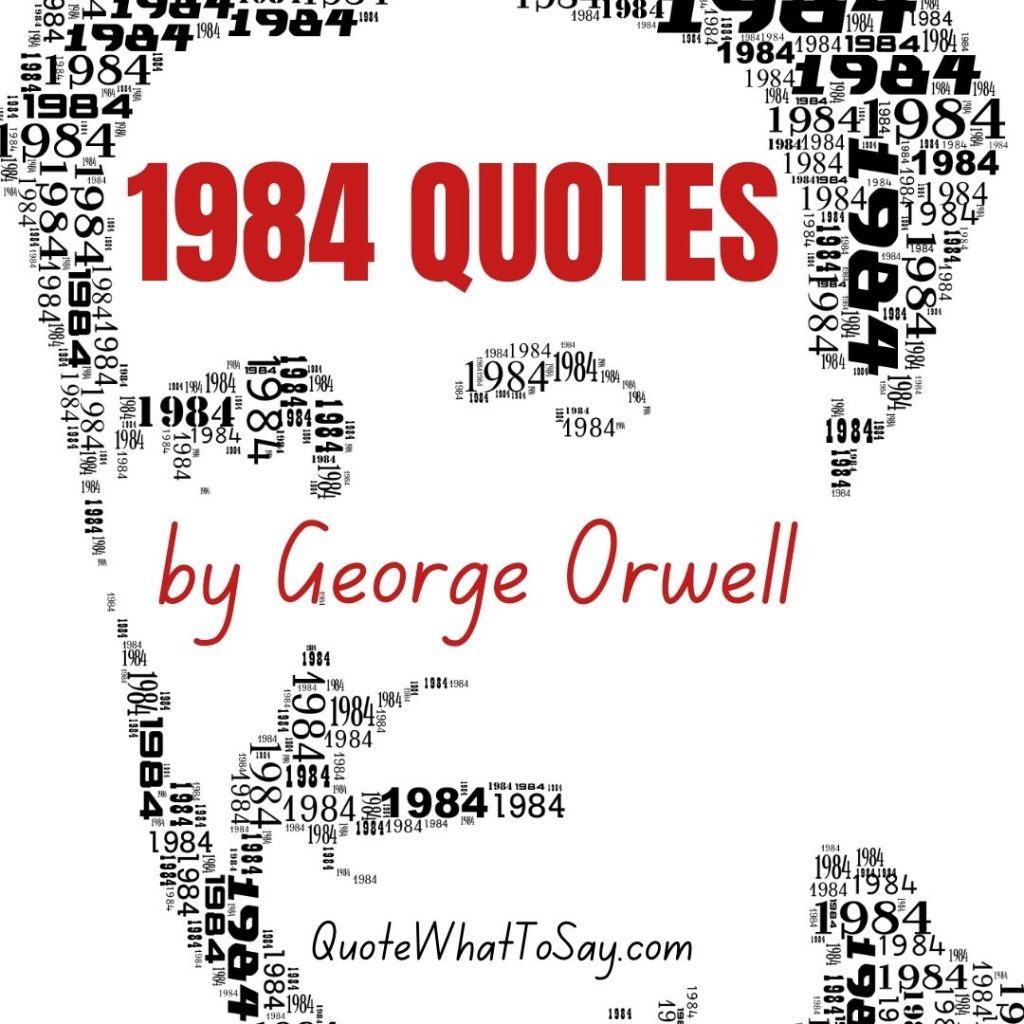George Orwell’s 1984 is a timeless literary masterpiece that explores themes of power, control, and the nature of truth in a dystopian society.
Through its vivid imagery and hauntingly prescient ideas, the novel delivers a chilling commentary on totalitarianism and the fragility of individual freedoms.
Quotes from 1984 have become cultural touchstones, reflecting Orwell’s incisive critique of propaganda, surveillance, and psychological manipulation.
Each quote serves as a powerful lens through which readers can examine the dynamics of oppression and resistance, making the novel as relevant today as it was at the time of its publication.

Quotes from 1984 Book: Page Number, Chapter, Editions.
1984 book by George Orwell has many editions, while page numbers may vary by editions with different pagination. Examples:
1984: First Edition published by Harcourt, Brace and Company, has 314 pages.
1984 (Essential Orwell Classics – Hardcover), has 326 pages.
1984: 75th Anniversary edition has 328 pages.
Best Famous 1984 Quotes by George Orwell
“We control matter because we control the mind.” – O’Brien
“War is peace. Freedom is slavery. Ignorance is strength.” – The Party slogan
“Who controls the past controls the future. Who controls the present controls the past.” – Party slogan
“The real power, the power we have to fight for night and day, is not power over things, but over men.” – O’Brien
“For, after all, how do we know that two and two make four? Or that the force of gravity works?” – Narrator, Winston’s reflection
Quotes from 1984 about Power and Totalitarianism
Power and totalitarianism are central themes in 1984, embodied in the Party’s unrelenting grip on society.
Quotes like “Power is in tearing human minds to pieces and putting them together again in new shapes of your own choosing” and “The object of power is power” reveal the Party’s obsession with absolute control.
Orwell critiques the oppressive nature of totalitarian regimes, highlighting their use of fear, manipulation, and psychological domination to maintain their authority, stripping individuals of autonomy and humanity.
“The object of power is power.” – O’Brien
“The Party seeks power entirely for its own sake.” – O’Brien
“The Party was the eternal guardian of the weak.” – Narrator
“We are different from all the oligarchies of the past.” – O’Brien
“It was a bright cold day in April, and the clocks were striking thirteen.” – Narrator
“We shall abolish the orgasm. Our neurologists are at work upon it now.” – O’Brien
“We are not interested in the good of others; we are interested solely in power.” – O’Brien
“Power is tearing human minds to pieces and putting them together again in new shapes of your own choosing.” – O’Brien
“We know that no one ever seizes power with the intention of relinquishing it. Power is not a means, it is an end. ” – O’Brien
“Always, at every moment, there will be the thrill of victory, the sensation of trampling on an enemy who is helpless.” – O’Brien
1984 Quotes about Manipulation and Control
Orwell’s 1984 exposes the mechanisms of government manipulation and control through quotes such as “Who controls the past controls the future.”
The Party’s ability to rewrite history, enforce thought conformity, and instill fear showcases the devastating power of propaganda and authoritarianism. This manipulation leaves citizens unable to discern truth, fostering blind loyalty and crushing dissent.
“We control life, Winston, at all its levels.” – O’Brien
“We make the brain perfect before we blow it out.” – O’Brien
“The Party was even prepared to alter the laws of physics.” – Narrator
“We shall squeeze you empty, and then we shall fill you with ourselves.” – O’Brien
“The object was not to stay alive but to stay human.” – Narrator, Winston’s thoughts
“The Party is not interested in the overt act: the thought is all we care about.” – O’Brien
“Do you realize that the past, starting from yesterday, has been actually abolished?” – Narrator
“Nothing was your own except the few cubic centimeters inside your skull.” – Narrator, Winston’s reflection
“Nothing exists except an endless present where the Party is always right.” – Narrator, Winston’s realization
“If the universe exists only in the mind, and the Party controls the mind, then the Party controls the universe.” – Winston Smith
“In the end, the Party would announce that two and two made five, and you would have to believe it.” – Narrator, Winston’s thoughts
“They could not alter your feelings; for that matter, you could not alter them yourself, even if you wanted to.” – Narrator, Winston’s reflection
“The Party told you to reject the evidence of your eyes and ears. It was their final, most essential command.” – Narrator, Winston’s reflection
“We do not destroy the heretic because he resists us: so long as he resists us we never destroy him. We convert him, we capture his inner mind, we reshape him.” – O’Brien
Quotes from 1984 Book about Big Brother
Big Brother is the omnipresent symbol of surveillance and authoritarianism in 1984. Quotes like “Big Brother is watching you” and “It is not enough to obey Big Brother: you must love him” illustrate the Party’s demand for total allegiance.
Big Brother is both a figurehead and a psychological weapon, representing the Party’s dominance over every aspect of life. Through him, Orwell critiques the cult of personality and the dehumanizing effects of totalitarian rule.
“You do not exist.” – O’Brien
“Down with Big Brother.” – Winston Smith, in his diary
“Big Brother is the embodiment of the Party.” – Narrator
“He loved Big Brother.” – Narrator, Winston’s final realization
“It is not enough to obey Big Brother: you must love him.” – O’Brien
“We do not merely destroy our enemies; we change them.” – O’Brien
“Big Brother is watching over you, protecting you.” – Party propaganda
“Big Brother is infallible and all-powerful.” – Narrator, Winston’s reflection
“He had won the victory over himself. He loved Big Brother.” – Narrator, Winston’s realization
1984 Quotes about Truth and Lies
Orwell explores the malleability of truth in a totalitarian state, as seen in quotes such as “The past was erased, the erasure was forgotten, the lie became the truth”. The Party manipulates truth to maintain control, forcing individuals to accept contradictory realities through “doublethink.”
Orwell warns of the dangers of distorting truth, emphasizing its vital role in preserving freedom and individuality.
“Reality is inside the skull.” – O’Brien
“Reality exists in the human mind, and nowhere else.” – O’Brien
“Doublethink lies at the very heart of Ingsoc.” – Narrator, Winston’s reflection
“If you want to keep a secret, you must also hide it from yourself.” Narrator, Winston’s thoughts
“The past was erased, the erasure was forgotten, the lie became the truth.” – Narrator, Winston’s reflection
“To know and not to know, to be conscious of complete truthfulness while telling carefully constructed lies.” – Narrator
“There was truth and there was untruth, and if you clung to the truth even against the whole world, you were not mad.” – Narrator, Winston’s thoughts
1984 Quotes about Freedom
Freedom in 1984 is a fragile concept, extinguished by the Party’s control. Quotes like “Freedom is the freedom to say that two plus two make four” and “To die hating them, that was freedom” highlight the struggle to preserve intellectual and emotional independence under an oppressive regime.
Orwell underscores the inherent human desire for freedom, even as the Party seeks to redefine it as subjugation, emphasizing the importance of resistance to authoritarianism.
“Freedom means the freedom to think for oneself.” – Winston’s diary
“To die hating them, that was freedom.” – Narrator, Winston’s reflection
“The object of power is power. The object of freedom is to deny it.” – O’Brien
“To the future or to the past, to a time when thought is free.” – Winston Smith
“Freedom is the freedom to say that two plus two make four. If that is granted, all else follows.” -Winston Smith
“The choice for mankind lies between freedom and happiness, and for the great bulk of mankind, happiness is better.” – O’Brien
1984 Quotes about Love, Hope, and Proles.
Love, hope, and the proles offer a glimmer of humanity in Orwell’s bleak world. Quotes such as “If there is hope, it lies in the proles” suggest that genuine human connection and the collective potential of the oppressed may hold the key to resistance.
However, the Party’s destruction of love and suppression of hope reveal the devastating impact of totalitarian rule on individual and societal well-being.
“If there is hope, it lies in the proles.” – Winston Smith
“The proles had stayed human.” – Winston’s reflection
“Even in sleep, they could not extinguish hope.” – Narrator
“Love was the one thing they could not destroy.” – Narrator
“The proles are the only hope for humanity.” – Winston Smith
“We shall meet in the place where there is no darkness.” – O’Brien
“Hope lay in the faint stirrings of rebellion in the proles.” – Narrator
“The proles are human beings. We are not human.” – Winston Smith
“The proles could remember what the Party sought to erase.” – Narrator
“The thought of the proles filled Winston with despair and longing.” – Narrator
“The world of love and hope was gone, but its memory lived on in the proles.” – Narrator
“They were loyal to one another; the proles had not become hardened inside.” – Narrator
“The proles, if only they could realize it, held the key to overthrowing the Party.” – Narrator
“Perhaps one did not want to be loved so much as to be understood.” – Narrator, Winston’s reflection
“There is no loyalty except loyalty to the Party. There is no love except love for Big Brother.” – Narrator, Party doctrine
“Tragedy, he perceived, belonged to an ancient time when there was still privacy, love, and friendship.” – Narrator, Winston’s reflection
“Until they become conscious they will never rebel, and until after they have rebelled they cannot become conscious.” – Winston Smith
Quotes from 1984 about Propaganda and Censorship
Propaganda and censorship are tools of the Party’s dominance in 1984. Quotes like “War is peace. Freedom is slavery. Ignorance is strength” highlight the Party’s control over information and thought.
Orwell critiques the use of language and media to suppress dissent, manipulate reality, and ensure compliance, warning of the dangers of unchecked state power over knowledge.
“Every record has been destroyed or falsified.” – Narrator
“To rewrite the past was a way to control the future.” – Narrator
“The heresy of heresies was common sense.” – Narrator, Winston’s thoughts
“Oceania was at war with Eastasia. Oceania had always been at war with Eastasia.” – Narrator
“Even the names of organizations reflected their propaganda: The Ministry of Love, The Ministry of Truth.” – Narrator
“Doublethink means the power of holding two contradictory beliefs in one’s mind simultaneously, and accepting both of them.” – Narrator
Quotes from 1984 Novel about Telescreens
Telescreens in 1984 symbolize the Party’s invasive surveillance. Quotes such as “The telescreen received and transmitted simultaneously” and “At any rate, the telescreen could spy on you night and day” emphasize the elimination of privacy and the constant monitoring of citizens.
Orwell illustrates the dehumanizing effects of perpetual surveillance, showing how it erodes trust, fosters fear, and crushes individuality.
“We are the dead.” – Winston Smith
“A telescreen was embedded in every wall.” – Narrator
“The telescreens barked orders incessantly.” – Narrator
“Privacy was no longer possible with the telescreens.” – Narrator
“The smallest flicker of your eyes could give you away.” – Narrator
“Even a back can be revealing; they watched everything.” – Narrator
“The telescreen received and transmitted simultaneously.” – Narrator
“At any rate, the telescreen could spy on you night and day.” – Narrator
“A gesture, an expression, a whispered word, could be detected.” – Narrator
“Every sound you made was overheard; every movement scrutinized.” – Narrator
“There was of course no way of knowing whether you were being watched.” – Narrator
“The telescreen could be dimmed, but there was no way of shutting it off completely.” – Narrator
Quotes from 1984 about Newspeak and Thoughtcrime
Newspeak and thoughtcrime are central to the Party’s control of thought. Quotes like “Thoughtcrime does not entail death; thoughtcrime IS death” and “The purpose of Newspeak was to make other modes of thought impossible” reveal the Party’s effort to restrict language and, consequently, free thought.
Orwell warns of the dangers of linguistic manipulation, showing how it enables authoritarian regimes to limit dissent and control the very fabric of reality.
“In the end, we shall make thoughtcrime literally impossible.” – Syme
“Newspeak was designed to diminish the range of thought.” – Narrator
“The revolution will be complete when the language is perfect.” – Syme
“To think and to speak in Newspeak was the ultimate orthodoxy.” – Narrator
“Thoughtcrime does not entail death: thoughtcrime IS death.” – Winston Smith
“The purpose of Newspeak was to make other modes of thought impossible.” – Narrator
“Thoughtcrime was not a thing that could be concealed forever.” – Winston Smith, in his diary
“Every year fewer and fewer words, and the range of consciousness always a little smaller.” – Syme
“Orthodoxy means not thinking – not needing to think. Orthodoxy is unconsciousness.” – Narrator, Winston’s thoughts
Other Quotes from 1984 by George Orwell
“Men are infinitely malleable.” – O’Brien
“Sanity is not statistical.” – Winston Smith
“What happens to you here is forever.” – O’Brien
“In the face of pain there are no heroes.” – Narrator, Winston’s thoughts
“The consequences of every act are included in the act itself.” – Narrator
“There will be no curiosity, no enjoyment of the process of life.” – O’Brien
“The long-hoped-for bullet was entering his brain.” – Narrator, Winston’s final moments
“If you kept the small rules, you could break the big ones.” – Narrator, Winston’s thoughts
“To see what is in front of one’s nose needs a constant struggle.” – Narrator, Winston’s thoughts
“Your worst enemy, he reflected, was your own nervous system.” – Narrator, Winston’s thoughts
“The best books… are those that tell you what you know already.” – Narrator, Winston’s reflection
“If you want a picture of the future, imagine a boot stamping on a human face – forever.” – O’Brien
“What can you do against the lunatic who is more intelligent than yourself?” – Narrator, Winston’s thoughts
“The masses never revolt of their own accord, and they never revolt merely because they are oppressed.” – Narrator
“It was not by making yourself heard but by staying sane that you carried on the human heritage.” – Narrator, Winston’s thoughts
“Even the humblest Party member is expected to be competent, industrious, and even intelligent within narrow limits.” – Narrator
“The room was a world, a pocket of the past where extinct animals could walk.” – Narrator, Winston’s thoughts about the rented room.
“Until they became conscious, they will never rebel, and until after they have rebelled, they cannot become conscious.” – Winston Smith
“If you can feel that staying human is worthwhile, even when it can’t have any result whatever, you’ve beaten them.” – Winston Smith
Summary: Nineteen Eighty-Four Novel by George Orwell
George Orwell’s 1984 is a dystopian novel that delves into the oppressive world of a totalitarian regime led by the Party and its enigmatic leader, Big Brother.
Set in the fictional superstate of Oceania, the story follows Winston Smith, a low-ranking Party member who works at the Ministry of Truth, where history is manipulated to fit the Party’s ever-changing narrative.
The novel portrays a society under constant surveillance, where free thought is suppressed, language is distorted through “Newspeak,” and individuals are coerced into blind obedience.
Winston secretly rebels against the Party by pursuing a forbidden love affair with Julia and seeking the truth through forbidden writings.
However, his defiance leads to his arrest by the Thought Police, resulting in psychological and physical torture aimed at erasing his individuality and enforcing loyalty to Big Brother.
Through its grim depiction of power, propaganda, and the erosion of truth, 1984 serves as a powerful warning against the dangers of totalitarianism and a chilling exploration of the human spirit’s vulnerability under oppressive regimes.
The novel remains a seminal work, resonating with readers as a cautionary tale about the perils of unchecked authority.





No Responses